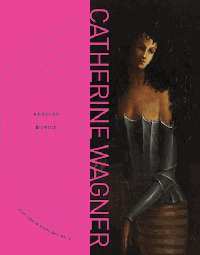 Nervous Device
Nervous Device
by Catherine Wagner
City Lights Publishers, October 2012
City Lights Spotlight Series No. 8
73 pages / $13.95 Buy from City Lights or SPD
I’ve had a copy of Catherine Wagner’s latest collection, Nervous Device, for three days and already it’s beat up, pages are folded and scribbled over, and the whole book is bent in half (the result of a heavy bashing I gave it against the side of my desk). Many of my most-loved books end up looking similarly destroyed, but the physical damage I’ve done to Nervous Device stems from a different impulse—what I can only call frustration.
So why am I frustrated with this unassuming, 73-page collection, particularly since I’ve been a Wagner fan since her first book, Miss America, came out in 2001? It’s because I don’t know how to find coherence in this collection and yet—here’s the frustration—I can’t stop reading it.
When I begin a new book of poetry I don’t look for cohesion of any particular kind, nor do I think all collections need to, or benefit from, coherence. However, in reading Nervous Device I felt that I was missing some critical structure that created a through-line in the book. I kept asking, why these poems? How is this a collection?
Then I realized maybe that was the point—Wagner isn’t interested in packaging the poems for us—we must do this ourselves. In an interview with Elizabeth Coleman at Art Animal (September 2012), Wagner speaks of her own concern with these poems, saying “‘I worry that in this book I’ve tried to be smart in some places because publishing with City Lights felt like a big deal…That’s a deadly thing—the wish to appear smart’” [full interview here]. I immediately stopped reading the interview, re-read Nervous Device, and realized I was trying to force a larger structure on the book when what I needed to be doing was enjoying it because of its language, poem by poem.
The abundance of word-play and its sonic complexities in these poems, for example, does an incredible amount of work, making the poems humorous and intelligent, creating a distinct voice. In “A Well is a Mine: A Good Belongs to Me” Wagner balances what might come across as gimmick with beautiful lyricism and smart, sudden turns. She writes:
mowed my garden down:
blacklily puddle. Let commerce
suck brights from all dally-halls
and string them christmas mines.Will folded, made a napkin
Old agendas used to clean my mouth
of will.
I built this tone
ironically; that is,
it goes against itself.
She pushes the language even further in the “math” portions of “A Well is a Mine” when she writes:
“Freedom x Need = Reality.”
“Freedom
————- = Art.”
Reality
“Then Art x Reality = Freedom.”
“Freedom
————- = Reality?”
Art
“Where art is politics.”
Though this type of writing might veer dangerously close to the cliché, the manner in which Wagner structures the language through repetitive dialogue both builds meaning and breaks it apart, mimicking, albeit in the form of abstraction, the way humans speak with one another. If viewed as an “ars poetica” of sorts, these lines function to intelligently explore questions of art’s place in contemporary society while mimicking both the logical (here, mathematical) constructs we try to place on artistic expression and the fragmented, cyclical nature of human language itself.
Most refreshingly, Nervous Device comes across as neither a self-indulgent, private collection written for Wagner’s own mind, nor is it an unintelligible, garbled mess of equally isolated language. Instead, Wagner balances disjunction and lucidity, private and public, distant and (riskily) up-close. In “Rain Cog,” for example, she writes:
Presence makes the
Liquid flush from pores in
My vaginal skin. There.
Followed, on the next page, by a “zooming-out” (though it retains the personal “I”) where she writes in “Unclang”:
is a bore, and it flattens lang, so, it takes experience to write a real poem
that is well-lit.
What I love most about Wagner is that she does not claim to be writing this “real poem.” Instead, Nervous Device revolves, on some level, about what Wagner described as “‘nervous in terms of self-consciousness, nervousness, but also nervous in terms of responsiveness and reactiveness…[where] the nervous device…wants you to hold it, it wants to be noticed, it wants you to see how it works to bind and separate.’” [ArtAnimal]
In this way, Wagner’s Nervous Device is a book that reminded me how to read what comprises a collection—poem by poem and line by line—so that I am able to appreciate the constant invention and reinvention of language that can occur when a great poet knows when to hold us close and when to let us go.
***
Jessica Comola currently lives in Oxford, MS where she is an MFA candidate at the University of Mississippi. Her poetry has recently appeared or is forthcoming in Everyday Genius, Anti-, HTML Giant, The Journal, The Columbia Review, and The Tulane Review.
Tags: Catherine Wagner, city lights, Jessica Comola, Nervous Device

[…] Wagner – Nervous Device: So it’s been a few days, my boyfriend is still out west with his family, I’ve cleaned the […]